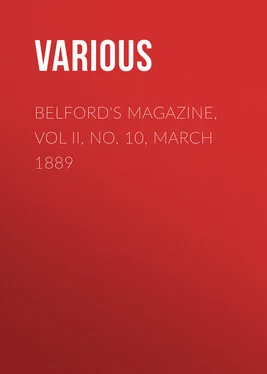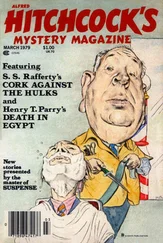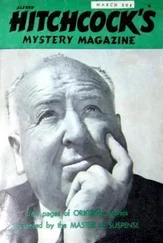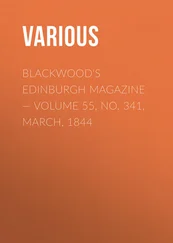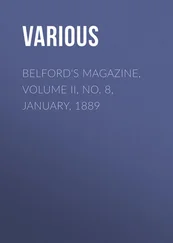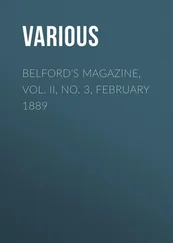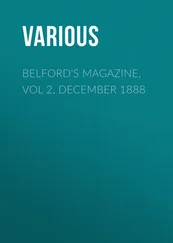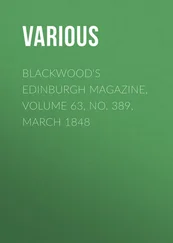Various - Belford's Magazine, Vol II, No. 10, March 1889
Здесь есть возможность читать онлайн «Various - Belford's Magazine, Vol II, No. 10, March 1889» — ознакомительный отрывок электронной книги совершенно бесплатно, а после прочтения отрывка купить полную версию. В некоторых случаях можно слушать аудио, скачать через торрент в формате fb2 и присутствует краткое содержание. Издательство: Иностранный паблик, Жанр: periodic, foreign_edu, на английском языке. Описание произведения, (предисловие) а так же отзывы посетителей доступны на портале библиотеки ЛибКат.
- Название:Belford's Magazine, Vol II, No. 10, March 1889
- Автор:
- Издательство:Иностранный паблик
- Жанр:
- Год:неизвестен
- ISBN:нет данных
- Рейтинг книги:5 / 5. Голосов: 1
-
Избранное:Добавить в избранное
- Отзывы:
-
Ваша оценка:
- 100
- 1
- 2
- 3
- 4
- 5
Belford's Magazine, Vol II, No. 10, March 1889: краткое содержание, описание и аннотация
Предлагаем к чтению аннотацию, описание, краткое содержание или предисловие (зависит от того, что написал сам автор книги «Belford's Magazine, Vol II, No. 10, March 1889»). Если вы не нашли необходимую информацию о книге — напишите в комментариях, мы постараемся отыскать её.
Belford's Magazine, Vol II, No. 10, March 1889 — читать онлайн ознакомительный отрывок
Ниже представлен текст книги, разбитый по страницам. Система сохранения места последней прочитанной страницы, позволяет с удобством читать онлайн бесплатно книгу «Belford's Magazine, Vol II, No. 10, March 1889», без необходимости каждый раз заново искать на чём Вы остановились. Поставьте закладку, и сможете в любой момент перейти на страницу, на которой закончили чтение.
Интервал:
Закладка:
Every great writer invents a pattern, and the Jane Austen pattern is as perfect as it is inimitable. It stands alone. The pattern is a very slight one, but so is that of the rarest and most beautiful lace. And in all sincerity I say that I would sooner sign myself the author of "Emma" than of any novel in the English language – the novel I am now writing of course excepted.
George Moore.Dear Sir: I have so many favorites – even in English-written fiction alone: I am very fond of good novels. I couldn't select one . Let me give you a few, only a few! The moment I have sent off this letter I shall be sure to repent some omissions. Fielding's "Joseph Andrews;" Scott's "Antiquary," "Guy Mannering," "Heart of Midlothian," and "St. Ronan's Well;" Dickens's "Pickwick," "Barnaby Rudge," and "Tale of Two Cities;" Thackeray's "Vanity Fair," "Pendennis," and "Esmond;" Charlotte Brontë's "Jane Eyre;" George Eliot's "Mill on the Floss;" Hawthorne's "Blithedale Romance;" and George Meredith's "Beauchamp's Career."
And I had nearly forgotten in my haste two great favorites of mine – Miss Austen's "Pride and Prejudice," and Gerald Griffin's "Collegians;" and, again, surely Hope's "Anastasius."
I had better stop.
Justin McCarthy.Sir: Your question is an extremely difficult one to answer. One likes some novels for one kind of excellence, others for another, and the favorite – the absolute favorite – is apt to depend a little upon the good novel one has read most recently, and a great deal more upon one's mood.
I do not think that I could name any one novel, either English or foreign, as my first favorite; there are at least four of Turgeneff's, the bare memory of which moves me almost to tears; but I could not choose between "Liza," "Virgin Girl," "Fathers and Sons," and "Smoke;" and, of course, Tolstoï's "War and Peace" is a masterpiece which every one will name as a favorite (I give the titles in English, as I have read all these in translations only, French or English), and indeed I think I ought almost to name it as the favorite among foreign novels.
To turn to English masterpieces, there are parts of Fielding's "Amelia," which for tenderness, sweetness, and rendering of character and of home life I think finer than anything more modern; but other parts of the book are so unpleasant that I cannot place it first. I think I must plead guilty to four equal favorites: "Amelia," "Esmond," "The Mill on the Floss," and "Villette;" but perhaps I might tell you to-morrow that I place "Vanity Fair" above "Esmond," and prefer "Middlemarch" to "The Mill on the Floss." Still I think to-day's choice is best, so I will stick to it.
It is impossible to know all one's reasons for preferring some books to others – the style, the diction, the subtle way in which the writer makes you feel many things he has left unsaid elude description; and one's own frame of mind when the book first became known may have a great deal to do with it. Unconsciously association has much to do with one's preferences. It is for the character of Amelia, and the charm of her relations with her husband, that I like this novel. Some of the scenes and dialogues between these two are to my mind perfect, absolutely true and beautiful and satisfying. "Esmond" is certainly very inferior to "Amelia" in point of illusion; one always is conscious that one is reading , and the characters are like people we have heard of, or who are at least absent from us; but Harry Esmond is, to my mind, the finest gentleman in English fiction, none the less noble for his little self-conscious air. I have always wondered why he is less popular than Col. Newcome. Except perhaps Warrington he is Thackeray's noblest male character; and "Esmond" is, I take it, the best constructed of Thackeray's novels, and exquisitely written. It is only because there is no woman worthy of the name of heroine that I cannot like this novel best of all. For the reverse reason, that there is no hero, I cannot place "The Mill on the Floss" quite first. Maggie is a beautiful creation, and the picture of English country-life inimitable; the Dodsen family in all its branches is truly masterly. But for deep insight into the heart and soul and mind of a woman where will you find Charlotte Brontë's equal? Her descriptive power and her style are unsurpassable, and Lucy Snowe can teach you more about the thoughts and griefs and unaccountable nervous miseries and heart-aches of the average young woman than any other heroine in fiction that I know of. There is no episode that I am aware of, of such heartfelt truth as that wretched summer holiday she passed alone at Madame Beck's. And every character in the book is excellent; and as for the manner of it, it seems wrung from the very heart of the writer.
F. Mabel Robinson.Dear Sir: I hardly know what to say in response to your question as to my favorite work of fiction. I am afraid I must go so far back as Defoe, of whose "Colonel Jack" and "Moll Flanders" I never weary. Amongst modern writers I greatly admire Blackmore, Hardy, and Besant. There is great genius and originality, too, in Christie Murray. But with Thackeray, Dickens, George Eliot, Nathaniel Hawthorne, Mrs. Gaskell, and the Brontë's on my shelves, the indication of any one work of fiction as my favorite since the days of "Roxana," "Pamela," "Joseph Andrews," and "Humphrey Clinker," would prove an undertaking which I fear I have not the courage to adventure.
W. Clark Russell.Sir: Your question seems to me to be a difficult, or I might almost say, an impossible one to answer. I do not see how a man of any carefulness of thought or decision can have one favorite work of fiction. To answer your question as simply as possible, I should say that of foreign books my favorites are "Don Quixote" and the novels of Goethe and Jean Paul Richter.
As regards English fiction, I should, I think, place George Eliot's "Silas Marner" first, both as a work of art and as fulfilling, to me, all the needs and requirements of a work of fiction; but I could not say this unless I may be allowed to bracket with this book Nathaniel Hawthorne's "House of the Seven Gables," Mrs. Gaskell's "Cranford," Jane Austen's "Persuasion," Mrs. Ritchie's "Story of Elizabeth," and William Black's "Daughter of Heth" – all of which books seem to me to stand in the very first rank, and not only to fulfil the requirements of the human spirit, but to stand the much more difficult test of being, each of them, perfect as a whole.
J. Henry Shorthouse.Dear Sir: You ask for the title of my favorite work of fiction. I answer that I have no one favorite work of fiction. Among the myriad novels which I have read there is none of excellence so supreme that I prefer it before all others. On the other hand, I have favorite novels – a dozen or so; I have never reckoned them up. These I will enumerate as they occur to me: "Don Quixote," "Tom Jones," "Ivanhoe," "The Heart of Midlothian," "Jane Eyre," "David Copperfield," "Tale of Two Cities," "Esmond," "Vanity Fair," "Adam Bede," "Lorna Doone," "Crime and Punishment" (Dostoieffsky), "Monte Cristo," and "Froment Jeune et Risler Ainé."
I do not suggest that these novels are of equal literary merit. I merely say that they are my favorites, that I have read them all with equal pleasure more than once, and that, as time goes on, I hope to read them again.
W. Westall. J. A. Stewart.A QUEEN'S EPITAPH
There lay the others: some whose names were writ
In dust – and, lo! the worm hath scattered it.
Интервал:
Закладка:
Похожие книги на «Belford's Magazine, Vol II, No. 10, March 1889»
Представляем Вашему вниманию похожие книги на «Belford's Magazine, Vol II, No. 10, March 1889» списком для выбора. Мы отобрали схожую по названию и смыслу литературу в надежде предоставить читателям больше вариантов отыскать новые, интересные, ещё непрочитанные произведения.
Обсуждение, отзывы о книге «Belford's Magazine, Vol II, No. 10, March 1889» и просто собственные мнения читателей. Оставьте ваши комментарии, напишите, что Вы думаете о произведении, его смысле или главных героях. Укажите что конкретно понравилось, а что нет, и почему Вы так считаете.
